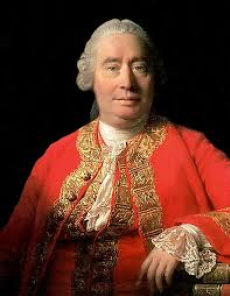
If you’re interested in philosophy, you’ll know all the greats. Plato, Aristotle, and maybe some later Enlightenment thinkers like Rousseau and Voltaire. But have you heard of the Scottish Enlightenment? This was a movement in Scotland at roughly the same time, it marked a rise in Scottish intellectuals and interest in Scottish political thought worldwide. Scots began to ask questions after the Act of Union was passed in 1707 – what would a closer association with England mean? In some cases, people are still asking themselves these questions today.
So David Hume and his possibly more famous successor Adam Smith were the main thinkers of this movement. Hume was Smith’s tutor, and they wrote a lot about the benefits of commercial society (the increased and more modern trade). He was a bit of a child prodigy, and went to university at the tender age of 12! He had a brief friendship with his fellow philosopher Rousseau, but the two fell out and Rousseau felt very bitterly towards Hume. His career was troubled, as many people saw him as an atheist, a step too far in the 18th century. Though he was controversial, his writings on political, religious and social aspects of life have proven very influential.
His economic ideas are also of importance, though, and that’s what we’ll be looking at. Hume believed that luxuries (i.e. goods/services not necessary for life, that only exists to improve our condition) could be good for people, provided they were not “vicious” or bad luxuries. Though it doesn’t sound radical, it would have been at the time, because some philosophers thought luxuries made our morals worse. According to Hume, a luxury could only be bad if it was at the expense of a virtue (or good thing, like charity). This argument connects to the idea that he was not religious, because if luxuries made our morals worse, they also made us less religious.
He also believed in something called the refined, or “polite” arts. Unlike science, this was more to do with things like artwork, literature and music. These would develop best in a monarchy, whereas the sciences would do better in a republic. Some say this parallels what was going on in Britain and France at the time – France was doing better in terms of technology, and Britain was doing well in the liberal arts fields.
Hume argued that there were many benefits to a modern, commercial/industrial society. One of these is that there would be more democracy – as the middle classes became successful financially, they would seek to protect and secure what they had gained from the upper classes, and so began demanding political rights. That’s why he has so much praise for the House of Commons. However, he acknowledged that a more commercial society would also have certain drawbacks. He believed that the tax system could be made fairer, as if most of it fell on the shoulders of the poor, they would be too poor to make anything good. If wealth was shared equally between everyone, then “the burden of taxation would fall lightly upon each shoulder”, but Hume acknowledged this was not the case and suggested taxing luxuries, so that only those who could afford them were taxed.
So, although that’s just one part of Hume’s philosophy, hopefully you’ve learned something about one of Britain’s greatest philosophers.
Image from: http://dopepicz.com/7241715-david-hume.html

0 Comment:
Be the first one to comment on this article.